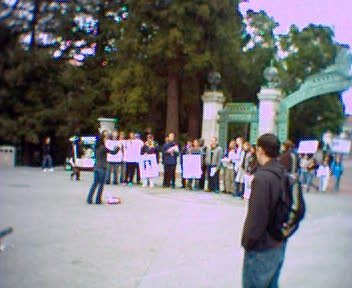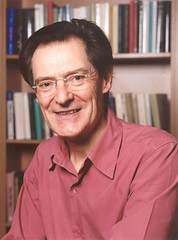WTF?
So I was walking into school today, hurrying to class, when I see a group of people standing in front of Sather Gate, singing. “Not more glee club bullshit,” I think (Berkeley appears to be infested with barbershop quartets). Then I notice they’re all holding placards denouncing Dick Cheney and some obscure banker called Felix Rohatyn. It turns out they were a choir of LaRouchies, singing medieval counterpoint and advocating using nuclear bombs on the moon, for reasons I couldn’t quite figure out.
In other insane conspiracy news, I recently discovered an article claiming that the Queen is buying up large tracts of land in the US and using them to build airports for freemasons. Her dastardly purposes in this endeavour remain obscure.
Houston manifesto
 Though I mostly agree with every other left-wing blogger that the appropriate response to this nonsense manifesto is either silence or a bit of mild giggling, I was interested to see this post which looks at it seriously in terms of its claim to be a left-wing document. The conclusion:
Though I mostly agree with every other left-wing blogger that the appropriate response to this nonsense manifesto is either silence or a bit of mild giggling, I was interested to see this post which looks at it seriously in terms of its claim to be a left-wing document. The conclusion:
Anyway, it’s nice to see a strong liberal statement come out, and for it to clearly show once again the dividing line between socialists and liberalism.
Multitude, p. 388, n. 112.
Totally feeling the fact that Michael Hardt is a fan of goth soft-porn novelist Laurell K. Hamilton. Well, I assume the reference is due to Hardt. Unless that’s what Negri was reading in jail after he got bored of memorizing Spinoza.
Listening
A propos of nothing in particular, here’s what I put on my MP3 player when I went away the other week:
- Alabama 3 - Outlaw
- More directly country-acid-house than their last one (I mean, their last proper album; obviously it’s more acid house than the acoustic album). “Last Train to Mashville” is particularly good.
- Girls Aloud - Chemistry
- I’m belatedly realizing that the video for “See The Day” was really good. As is the video for “Whole Lotta History.”
- Tatu - Dangerous and Moving
- For non-native speakers of English, they have some great lyrics. I realize F. R. Leavis is, strictly speaking, dead, but I’m considering convoking a seance in order to get a New Critical interpretation of “Cosmos”.
- DJ Whoo Kid and DJ E-Rock - Bay Bidness
- A Bay Area mixtape which features a great track from Hoodstarz which introduced me to the expression “Get your grown man on,” i.e., dress up in proper clothes. Also, the splendid E (or X, or purple, as the Americans call it) fueled R&B lightness of J. Valentine’s “Go Dumb”. Also, E-40’s “Tell Me When to Go,” which has a great Oakland-set video.
- Ghostface Killa - Fishscale
- The absurdly sentimental Ghostface Killa is as good as ever. Features a song about getting beaten by his mother which is all upbeat soul-samples and heartbreaking lyrics.
- Yeah Yeah Yeahs - Show Your Bones
- I thought this was a bit blah when I first heard it, but it’s really grown on me. Manages to be both surprisingly conventional and more experimental than most of the British neo-post-punk I’ve heard.
I also listened to a podcast of Mark Lawson interviewing Orhan Pamuk about being put on trial for not denying the Armenian genocide. Mark Lawson remains a wanker, though.
“The Left Wing attack on ontological reality”
So the CPE is to be scrapped. Victories of this sort are strangely double-edged. Of course, the reminder of the power of political action can be an impetus for further action. But a victory like this is always partial, but the framing of the action in specific terms can lead to a demobilization which allows for the same outcome by other means. The talk of replacing the CPE with “measurements in favour of the professional insertion of the young people more in difficulty,” makes clear the danger here. As I’ve said before, the problem with single-issue campaigns is that they focus on one issue too many.
Besides which, I think Rachel was quite right to look at the limitations of the defensive way in which the anti-CPE campaigns have been articulated (as well as k-punk, see this older article from Angela of the archive). Bat proposed the slogan, “be unrealistic, demand the possible,” and this looks like it would provide a justification for a certain defensiveness. After all, the actually existing employment protection or welfare state are a fortiori possible, and so seem to disprove capitalist realism’s claim to define the possible. But I wonder if this is true. Capitalism’s spurious discourse of novelty
is always capable of declaring that the actually existing is no longer possible, that is, to render something impossible without any regard to what we might want to regard as the facts. To base our struggle on the possible, then, even something we can rigorously demonstrate to be possible, is to choose to fight on terrain dominated by capitalism.
What’s right about bat’s slogan, though, is the distinction he implies between utopianism and revolutionism. A properly revolutionary impossibilism can’t just put forward any impossibility we might happen to like (although I’m fond of Fourier’s talk of anti-whales and anti-beavers catching fish for us after the revolution). What we need to do is find the impossible within the actual. I’m reminded of Derrida’s quasi-transcendentalism. Although it’s sometimes taken to be, like Blackburn’s quasi-realism, a kind of bad-faith transcendentalism in which we act as if there were a transcendental support even though we “know” there isn’t, this is an entirely incorrect reading of Derrida (indeed, so wrong it probably doesn’t deserve to be called a reading at all). What Derrida actually says is that the quasi-transcendental shows that a condition of possibility is also a condition of impossibility. This could be taken as a kind of nihilism, but I prefer to interpret it, as John Caputo does, as a messianic argument for the possibility of an absolutely different future. The point is, capitalist reality is no less impossible than the communist future; the difference lies in who has the power to enforce their impossibility.
I was recently reading Wendy Brown’s States of Injury, as it is one of the set books in a class I’m grading papers for. I was pleased to see that Brown (writing in 1995) makes arguments against defensive left-wing projects which have a lot of resonance with the arguments being put forward around the CPE. Amusingly, a number of the students described Brown as saying that “we should be amoral and concentrate on struggling for power.” That’s a funny way to put it, but they do sort of have the right idea.
Are they related?
At any rate, it certainly makes Skinner’s polemical article “Meaning and Understanding in the History of Ideas” even more enjoyable if you do a bad impersonation of Roger Moore while you read it.
Rhode Island Red
One of the advantages of America is that it’s so huge, travelling more or less anywhere takes a long time. I like long journeys; somehow the length of the journey always feels like extra time you’ve got for free from somewhere. On the flight over here, I managed to read a fair amount of Being and Event, which I’ve been meaning to do for a while without much success.
The metaphysical bargain that gives you this extra time has a price: airports. I’m not sure why they make me come over all Dave Spart, but watching lines of people shuffling forward towards security guards, meekly removing their belts and shoes, always makes me think of other lines of people being lead towards showers. And no matter how many times I hear them, I can’t bring myself to believe that the recorded announcements that “all service personal are welcome in the USO lounge,” are happening in reality rather than Starship Troopers.
Anyway, I’m in Providence for a conference. You can read my paper, if you like; it’s about Tocqueville’s Democracy in America (it’s very slightly more interesting than that suggests).
Hi. I haven’t posted on here for ages, since I’ve been rather busy with the second year of my degree, and I’ve found that I haven’t really had much to say. Also, I think I used to have a rather naïve position on issues like anti-capitalism and feminism (possibly as a result of reading too much Chomsky), and I’m trying to decide what I actually think at the moment. Anyway, I’ll get on with the post.
“The rhetoric of today’s political leaders serves neither construction nor conservation. Its aim is to dismantle. Dismantle what has been inherited from the past, socially, economically and ethically, and, in particular, all the associations, regulations and mechanisms expressing solidarity.â€?
I’ve just been reading John Berger’s article on the protests in France (he is quoted above – I got the link from Lenin’s tomb). In it, he writes about the rhetoric used by politicians to hide the “process of dismantling, � to make it look as if it were natural and inevitable. However, I think that this article makes it seem as though the dismantling of public services is inevitable. He seems to mostly express nostalgia for “what has been inherited from the past, socially, economically and ethically�.
I really like the article about the protests on the K-punk blog. K-punk says that “if anti-capitalism is equated with ‘immobilization’, not only will it prove ineffective, it will actually serve as part of the ideological framework of Capitalism.� This is because it confirms that “capital owns the future,� and the only option for us is to take a stance that we know will be defeated.
Mostly, when I talk to friends about neo-liberalism, they agree that it’s bad, but they say that they think it is inevitable. None of my friends want job insecurity and terrible student loan debts, but they think that it’s going to happen anyway so they may as well get on with it, and make the best of it (k-punk writes about how arguments in favour of neo-liberal reforms appeal to reality, rather than to improvement in the post “Capitalist Realist Straw Women�. Unfortunately I can’t find a way to link directly to it). They really have no reason to protest against it, while we take this “romantic but inevitably defeated Canute-like stance�. I just don’t really know how, practically, we can protest against these reforms, without being nostalgic.
Recently there was a library occupation at Sussex, just after the lecturer’s strike, in protest against the neo-liberal reforms at Sussex (I couldn’t get to it, unfortunately). The demands do seem to have been mostly defensive, for example, “opposition to the introduction of top-up fees.� I’m not sure what the solution is, possibly to oppose top-up fees, and to try to take over the university! I think I remember Tim suggesting something like this ages ago.
Also, I’m not sure why there were yoga classes at the library occupation. Hippies are damn annoying! Now I really should get back to work (I have to read about Heidigger and moral realism today.)
“The dispute over the reality or non-reality of thinking which is isolated from practice is a purely scholastic question”
A little while back, k-punk argued against my advocacy of what we might call something like a Marxist hospitality towards religion, or a construal of the Marxist critque of religion which doesn’t amount to a rejection of religion as false. I think our point of disagreement is summed up in Mark’s comment:
If the Marxist critique of religion is not premised on its falsity, it certainly assumes that falsity. The falsity of religion consists precisely in its denial of the claim that it arises from specific material conditions, surely.
It seems to me that Mark’s position here implies a very particular conception of truth, one which I doubt Mark actually holds, but one which it would clarify my position on ideology to think about more thoroughly. To say that Marxism conflicts with religion, and that religion’s basis in particular material conditions thereby demonstrates the falsity of religion, both seem to depend on the idea that there is a singular truth which can be understood as a relation between statements and the world without considering the (various, contingent, historical) frameworks that mediate that relationship. This is the kind of correspondance theory of truth employed by particularly naïve forms of scientific realism. But I think this account of truth is the wrong one for us to use here, for two reasons.
First, I’m not at all sure that religions need to depend on this understanding of truth, in other words that they need to deny that they arise from specific material conditions. Actually, I think it’s pretty much a necessary feature of religions that they don’t; while it’s true that contemporary American Christianity buys into this scientistic account of truth (and some Islamic fundamentalism may do as well, I don’t know enough about contemporary Islam say), that’s precisely not because it’s an essential feature of religion, but because American evangelism is radically confused about the whole concept of religion (and probably heretical, too). Besides, if we interpret Christianity in the sort of truth-functional terms which are natural to modernity, Christianity is just trivially false. It’s not even worth arguing about whether God exists or Jesus rose from the dead if these are meant in the same sense as we would say a chair or table exists; of course religion isn’t true in that sense. If religion is worth critiquing at all, that must involve figuring out how it can make assertions which function in some other way. This is something I’ve never figured out (I’m an atheist more out of bemusement than anything else), but starting with hyperstitial effectiveness seems promising.
Leaving that aside, we clearly cannot accept as Marxists that demonstrating the social basis of a belief thereby demonstrates that it is false. This reminds me of the sad fate of Foucault in American universities, where self-proclaimed Foucauldians spend their time “critiquing” claims by showing that they are outcomes of power relations and thereby false. Of course Foucault said just the opposite, that it is precisely being the result of power relations that makes a statement true; and just as well he did, because otherwise his theory would be self-undermining. Likewise, as far as I can see, Marxism gives us no room to suppose that any belief is not the outcome of particular social relations, and so cannot coherently (or even usefully) hold that identifying the social basis of a belief makes it untrue. Again, hyperstitial effectiveness seems like a better reference than truth. If the truth of Marxism has any special value, it is because Marxism is the ideological side of revolutionary practice. But that doesn’t imply anything either way about the truth of religion; that, instead, will depend on whether or not religious ways of thinking can inform revolutionary struggle.
FOR THE UNCONDITIONAL MILITARY DEFENCE OF BRITNEY FROM SEXIST WITCH-HUNTS!
From antipopper, via.




